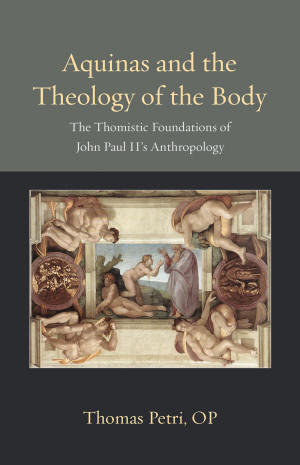Book Review
Aquinas and the Theology of the Body:
The Thomistic Foundations of
John Paul II's Anthropology
by Thomas Petri, OP
The Catholic University of America Press (April
20, 2016)
ISBN: 978-0813228471
 The
Theology of the Body (TOB) refers to the topic of a series of lectures
given by Pope Saint John Paul at his Wednesday audience between 1979 and
1984. To a certain extent, it was seen as his defence of the encyclical
Humanae Vitae. It has since been popularised and, some might say,
over-romanticized and over- sexualised. In response, certain critics have
argued that TOB is a departure from the Catholic tradition. In this book,
Dominican Fr Petri argues that John Paul's anthropology is rooted in the
ontology of Saint Thomas Aquinas. Thus TOB as proposed by John Paul is
compatible with the Catholic tradition. I must say that, as someone with
an open mind on this issue, Fr Petri puts forward his arguments very well
throughout the book.
The
Theology of the Body (TOB) refers to the topic of a series of lectures
given by Pope Saint John Paul at his Wednesday audience between 1979 and
1984. To a certain extent, it was seen as his defence of the encyclical
Humanae Vitae. It has since been popularised and, some might say,
over-romanticized and over- sexualised. In response, certain critics have
argued that TOB is a departure from the Catholic tradition. In this book,
Dominican Fr Petri argues that John Paul's anthropology is rooted in the
ontology of Saint Thomas Aquinas. Thus TOB as proposed by John Paul is
compatible with the Catholic tradition. I must say that, as someone with
an open mind on this issue, Fr Petri puts forward his arguments very well
throughout the book.
In order to demonstrate his thesis, Fr Petri presents his reader with a solid account of Thomistic metaphysics, anthropology and the teachings of Saint Thomas on virtue, love and marriage. While Thomas has a lot to say about the nature of love and the human emotions that are still relevant, his account of personhood is somewhat deficient and John Paul's more person centred anthropology as put forward in TOB can correct this, says the author. It is also noted that while it is true to say that for Aquinas, the man is the head of the family, he also argues that it is the wife who manages the equally important interior life of the family. For both Aquinas and John Paul, there is a very real difference between male and female: they would both have distanced their teachings from the contemporary one of gender fluidity.
And so we have an interesting conclusion: as compared to Aquinas and John Paul, some of our contemporaries are seemingly more spiritual in that they pay less attention to the physical and more to the interior world. Or perhaps we are just living in very confused times.
The physical world is indeed important for both Aquinas and John Paul. After the Fall, man became alienated from his body. It was Christ's sacrifice which redeems our souls - and our bodies. We are once again able to communicate with our bodies in an orderly way.
Fr Petri notes that Aquinas has much to say on all of this. For Aquinas, created beings have an appetite for perfection. Because we are embodied beings, both our souls and our bodies are called to perfection. Human love is different from the animal passions because our emotions must serve our rational appetite. The conjugal act must thus be ordered to reason and it is marriage that is the reasonable place for this.
Aquinas also sees marriage as the place for the highest form of human friendship. There is a certain equality between husband and wife, what may be referred to as domestic justice. Monogamy and indissolubility are prerequisites for this form of justice.
Aquinas also notes that husbands and wives have a certain degree of authority over each others' bodies. He refers to this as the marital debt. This is what John Paul calls the gift of self.
Fr Petri also notes that for Aquinas, marriage is a union of souls. Since the body cannot be separated from the soul, it is the conjugal act which is that point of contact for this union of souls. Thus Aquinas has a very high regard for marriage.
Throughout this book, Fr Petri has brilliantly argued that much of the teachings in TOB have Thomistic foundations and it is thus in keeping with the Catholic tradition.
Reviewed by Dr Pravin Thevathasan
